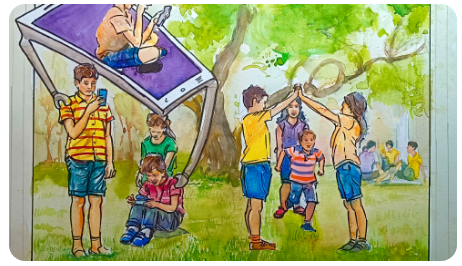Times have evolved and so have childhoods now-a-days. The Digital Age, also known as The Information Age has had a huge impact on the kids. According to UNICEF, youth (ages 15-24) are the most connected age group. The good old television has been replaced by I-pads, computers and smartphones.
Children are born with gadgets in their hands and they are practically living in a virtual world. Habits have evolved drastically for the trend of playing outdoor games has declined and they are glued to their screens. Video games and social media have taken over causing chronic fatigue, sleep deprivation and exhaustion.
According to Anita Tayal, a high school counsellor, owing to vanity-based concepts being shared on social media, there is an unnecessary comparison amongst teens on the basis of height, weight, complexion causing a rise in the cases of cyberbullying.
COVID has made things worse for the students. With classes being held online, and interaction with friends being done the same way to maintain social distancing, it has caused time mis-management. This fact has also been substantiated by the American Academy of Paediatrics. Their study shows “soaring rates of mental health challenges among children, adolescents, and their families over the course of COVID-19 pandemics, exacerbating the situation that existed prior to the pandemic.”
Ekroop Kahlon, a junior school teacher has observed that kids belonging to the age group of 7-12 years “have an extremely limited span of attention. In the beginning, the concept of studying in a classroom and sharing space was alien to them.” She added that a “whole lot of them struggled with making friends and interacting with their classmates. Restlessness and unnecessary whining were very common symptoms among kids.”
Nowadays, both the parents are working, so their own interaction with kids is bare minimum, let alone with the neighbours. Furthermore, the physical interaction of kids with their parents has decreased causing kids to face problems like alienation, borderline depression and loneliness. The trend of social engagement has evolved for children who are not willing to chat face to face, but feel more comfortable within the 4 walls of their rooms simply because they have the option of quitting the chat according to their convenience.
The Counsellor also added that “due to a shift from joint to nuclear family structure, there is a paucity of company of cousins inside the house and owing to safety concerns, there is a lack of neighbourhood friends outside the house.”
An interesting suggestion by Counsellor Tayal is that schools should have one full day devoted to play time once a week. They should be allowed to spend free time and encouraged to play casually to enforce the fact that “one can enjoy without worrying about any consequence and for pure entertainment.” Formal coaching in sports is a must for it imbibes confidence and healthy competition, but at the same time, she said “it has a sense of responsibility of performing well attached to it.”
The parents can take simple steps like going out for walks, limiting screen time, involving them in basic household chores can work wonders. Making them spend time with their grand-parents just so they know that life can be lived in a different yet enjoyable way is also a solution. Drawing them away from the screen without making the kids feel that it is being done to them forcefully is a good way to parent.
Jasmine Khaira, a working from home mother of 2 kids shared her opinion. In the beginning of the pandemic, when there was uncertainty as to how long it would last, she, like many mothers, noticed a change in the consumption pattern of her kids. To curb the problem of excessive content consumption, she made them watch TV for a particular period of time and joined them in playing outdoors. She said that, both “have been asked to adopt one hobby and pursue it religiously and they are allowed to search for more information online.” She added that “not only will this make them tech savvy, but would also allow them to surf responsibly. The suggestions that pop-up are related to their interests and they are able to get better ideas.”
Being a millennial, “we were exposed to gadgets at a much later stage i.e., around late 20s”. She added that “the problem is with how much content is being consumed and how much of it should be consumed.” Many parents, she said, are not able to “judge as to how much or how little should a child be allowed to spend time on screen and to prevent the side effects, they simply ban use of all gadgets which causes a child to be rebellious. This is not a possibility because if kids are not tech savvy in this digital world, they will feel handicap in the future.”
To spend some “extra time with our kids we have even revived old school trends like playing hide and seek, vish-amrit, house-house (or ghar-ghar) as well as educational non-computer-based games like Name-Place-Animal-Thing which have become obsolete”. Once a month sleepover with cousins to watch a movie or show together in a common room has now become a practice.
When contrasted with informal style of physical activity, old school games are important because running around aimlessly helps in releasing oxytocin in the brain. Counsellor Tayal also added that “it helps in improving emotional, intellectual, and behavioural development.” Nature also plays a major role in the growth of a child. Going out in fresh air, running around aimlessly, chasing random dogs, playing self-invented games with a group of friends had its own charm. Letting one’s imagination run wild is a very important mental exercise.
Now that the world has changed, it is not wise to draw them away from gadgets for that’s how the world will run in future. The need of the hour is to teach them balance i.e., balancing interaction with the physical world vis-à-vis the virtual world so that they can have the best of both worlds.

)
)
)
)
)
)
)
)
)
)